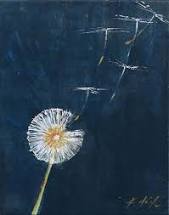
I pray not only for them,
but also for those who will believe in me
through their word,
so that they may all be one,
as you, Father, are in me and I in you,
that they also may be in us,
that the world may believe that you sent me.
And I have given them the glory you gave me,
so that they may be one, as we are one,
I in them and you in me,
that they may be brought to perfection as one,
that the world may know that you sent me,
and that you loved them even as you loved me.
– John 17:20-23
In Session 65 Fr. Thomas used the story of Mary and Martha as an example of the awakening of spiritual attentiveness. As spiritual attentiveness develops, our spiritual faculties awaken. If you refer again to the “skyscraper” or philosophical model, the spiritual faculties start at the intuitive level with the passive intellect and will to God, moving from there to the still point and God, the ground unconscious.
Once spiritual attentiveness is awakened in us, we become more attuned to the Spirit in all of life. The attentiveness that is awakened is beyond concepts and emotions and we experience what Fr. Thomas calls the undifferentiated presence of God. These spiritual experiences of God as God become harder to describe. The Fathers of the Church offered a teaching on the spiritual senses using the familiar language of our external senses.
The first sign of spiritual attentiveness is the attraction to interior silence – a time of prayer, to be still, in solitude and quiet. This is likened to the sense of smell where a perfume or aroma attracts us toward it. This attraction awakens the desire to rest in the presence, to be open and to surrender, to be free from the domination of the emotional programs.
In Crisis of Faith, Crisis of Love, Fr. Thomas says, “The will is the mouth of the soul. When the Spirit pours divine love into that faculty, our whole being experiences God not only as an attraction but as a Presence. This is the inner experience of being embraced by God. The Fathers attributed this experience to the spiritual sense of touch.” He goes on to say that this spiritual sense of touch is more intimate than the sense of smell because we may feel as if we are enveloped in God’s embrace.
The spiritual sense of taste is even more intimate because it is an interpenetration of spirits. Again, from Crisis of Faith, Crisis of Love, “When we taste something, we usually consume it and transform it into ourselves; it becomes part of us. In divine union the presence of God arises not only as an irresistible attraction or embrace, but as a unifying presence in our inmost being… When our whole being is rooted in God, we see him in everything and everything in him.”
These spiritual experiences through the spiritual senses open us to an even greater grace, a fruit beyond any experience, of the invincible conviction of always being in God and God in us. From Crisis of Faith, Crisis of Love, “The divine presence invites us not only to union, but to unity… God, the divine energy, is so powerful and so intimate that no human faculty can perceive it in its purity. But faith receives the grace of divine union by consent. The growing conviction, born of spiritual experience and the purification of contemplative prayer, gradually awakens us to the reality of faith as the narrow way that leads to the pure love of God.”
A Meditation
“Still, the spiritual journey continues even after the movement into Transforming Union. There remains the movement from divine union to unity, the letting go of one’s self-identity as a fixed point of reference, a passage that might be called the Night of Self. Perhaps a poem can suggest its extraordinary significance for understanding the purpose and meaning of our lives in particular and the whole process of human evolution…
The Night of Self
When the self relativizes
And the ‘me’ disappears,
There is not much left of time.
There is only the present moment.
Time which once was most of me,
Like ‘me,’ is now no more –
Just a memory.
When all anxious seeking stops
Unity begins.
But every time I act
Even if to pray
Unity dissolves.
When all striving ceases
I awaken to behold
Ever-present Awareness
Keeping silent watch.”
-Thomas Keating, Fruits and Gifts of the Spirit
To Practice
- View the video excerpt “The Spiritual Senses, Part 2” which is about 27 minutes in length.
- For some of us unity consciousness may seem like another one of those elusive states, hard to understand, even harder to imagine ourselves ever experiencing it. But look at Fr. Thomas’ definition of unity in his poem: “When all anxious seeking stops Unity begins.” Reflect on times in your life when all anxious seeking stopped and see if you can remember what you experienced.





